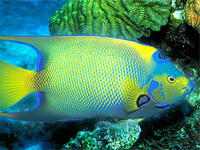Sustainable Fishing Lands $5M in Funding from Green Group

At Google's headquarters this afternoon, the Environmental Defense Fund unveiled a first-of-its-kind revolving loan program aimed at rebuilding California's fishing industry in an environmentally friendly manner.
The $5 millionCalifornia Fisheries Fundwill support fishermen, buyers and distributors that are working to build an ecologically sustainable fisheries industry that maintains both fish populations and fishing communities.
"Without the California Fisheries Fund, these fishing businesses probably wouldn't get loans, and without loans, the entire seafood supply chain, starting with the fishermen, can't make the necessary investments to make fishing more sustainable," said Michael DeLapa, manager of the CFF. "We expect these loans to be paid back because we're confident about the growing market for environmentally-friendly fish and the new value created by management innovations."
At the event at Google's campus, the EDF unveiled the first three loans under the program. The recipients have been picked in keeping with the CFF's mission to provide much-needed capital to fishermen and businesses whose experimental methods of sustainable fishing cause additional problems with lining up funding.
One of the first loans, in the amount of $25,000, goes to theMorro Bay Fish Companyin the form of a working capital line of credit; the CFF will also give the firm a 5-year, $100,000 loan to remodel its freezer, purchase a delivery truck and build a hoist on its dock. The company will use the funding to continue its work in buying, delivering and marketing fish caught sustainably by local fishermen in the central California coast.
The Fisheries Fund is also providing a $150,000 line of credit toCentral Coast Seafood, also based in central California in the town of Atascadero. The company will use the funds to invest in its inventory of black cod and promoting the fish at markets. Black cod is one of the species of fish whose quotas are on the rise because of the health and abundance of the fish's stocks.
"Our business model depends on maintaining a reliable supply of fresh fish caught in ways that maintain healthy fish populations," said Giovanni Comin, owner of Central Coast Seafood. "Our California Fisheries Fund loan will make it a lot easier to deliver sustainable seafood to markets worldwide."
Overfishing and water pollution are among the leading causes of declining fish stocks around the world, and while some corners are promoting aquaculture fish-farming operations as a solution to the issue, many fish farms result inhigh levels of pollutionfrom concentrating fish waste and the need for antibiotics to keep the fish healthy in tight quarters.
Among the companies that have committed to supporting sustainable fishing industries are Google, whose cafeteria purchases seafood from Central Coast Seafood, as well as Wal-Mart, which set a100 percent sustainable fish targetin 2006, and Whole Foods, whichraised its standards对养殖seafood in September 2008.
Fish photos CC-licensed by Flickr userslaszlo-photoandBrajeshwar.
The $5 millionCalifornia Fisheries Fundwill support fishermen, buyers and distributors that are working to build an ecologically sustainable fisheries industry that maintains both fish populations and fishing communities.
"Without the California Fisheries Fund, these fishing businesses probably wouldn't get loans, and without loans, the entire seafood supply chain, starting with the fishermen, can't make the necessary investments to make fishing more sustainable," said Michael DeLapa, manager of the CFF. "We expect these loans to be paid back because we're confident about the growing market for environmentally-friendly fish and the new value created by management innovations."
At the event at Google's campus, the EDF unveiled the first three loans under the program. The recipients have been picked in keeping with the CFF's mission to provide much-needed capital to fishermen and businesses whose experimental methods of sustainable fishing cause additional problems with lining up funding.
One of the first loans, in the amount of $25,000, goes to theMorro Bay Fish Companyin the form of a working capital line of credit; the CFF will also give the firm a 5-year, $100,000 loan to remodel its freezer, purchase a delivery truck and build a hoist on its dock. The company will use the funding to continue its work in buying, delivering and marketing fish caught sustainably by local fishermen in the central California coast.
The Fisheries Fund is also providing a $150,000 line of credit toCentral Coast Seafood, also based in central California in the town of Atascadero. The company will use the funds to invest in its inventory of black cod and promoting the fish at markets. Black cod is one of the species of fish whose quotas are on the rise because of the health and abundance of the fish's stocks.
"Our business model depends on maintaining a reliable supply of fresh fish caught in ways that maintain healthy fish populations," said Giovanni Comin, owner of Central Coast Seafood. "Our California Fisheries Fund loan will make it a lot easier to deliver sustainable seafood to markets worldwide."
Overfishing and water pollution are among the leading causes of declining fish stocks around the world, and while some corners are promoting aquaculture fish-farming operations as a solution to the issue, many fish farms result inhigh levels of pollutionfrom concentrating fish waste and the need for antibiotics to keep the fish healthy in tight quarters.
Among the companies that have committed to supporting sustainable fishing industries are Google, whose cafeteria purchases seafood from Central Coast Seafood, as well as Wal-Mart, which set a100 percent sustainable fish targetin 2006, and Whole Foods, whichraised its standards对养殖seafood in September 2008.
Fish photos CC-licensed by Flickr userslaszlo-photoandBrajeshwar.




